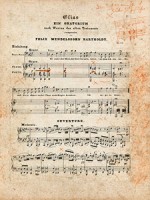Title
After two years in a secure off-site storage location, the wonderful treasures of our extraordinary Juilliard Manuscript Collection were brought “home” to Juilliard this August. Manuscripts by such composers as Bach, Beethoven, Brahms, Debussy, Mahler, Mendelssohn, Mozart, Schubert, Schumann, Richard Strauss, Stravinsky, and Wagner now reside directly across the hall from the library in the architecturally-exquisite Scholars Reading Room.
Body
And, if we did not have enough to celebrate with completion of the new room, Juilliard Chairman Bruce Kovner, the extraordinarily generous donor of the Juilliard Manuscript Collection, has decided to add to the collection with his donation of two new manuscripts: the engraved proof-copy vocal score of Mendelssohn’s Elijah, with extensive corrections and annotations by the composer, and Beethoven’s corrected manuscript of his “Kreutzer” Sonata for Violin and Piano, Op. 47. Both of these manuscripts exemplify Mr. Kovner’s keen interest in collecting “messy” sources, or those that show clear evidence of composer’s working practices.
At the time of its auction sale, the Elijah score was described by Sotheby’s as “a striking and important item: a proof of the vocal score of one of Mendelssohn’s greatest works, extensively and heavily revised by the composer, following the first performances.” In keeping with Mr. Kovner’s desire to share his treasures with the scholarly community, he arranged for the score to be digitized so copies could be provided to scholars who edited the new Barenreiter score of the work, released this year in conjunction with the worldwide celebrations marking the 200th anniversary of Mendelssohn’s birth.
The score of Beethoven’s “Kreutzer” Sonata is the only surviving complete manuscript of this renowned work. It is a complex manuscript, in the hand of several copyists, with extensive revisions by the composer as well as annotations by his pupil Ferdinand Ries. Formerly in the archives of Simrock, the publisher of the first edition of the work, the manuscript was acquired by the Henle publishing house in 1954, and resided in its archives until its sale at Sotheby’s in 2007.
I shared the news of this exciting new acquisition with Professor L. Michael Griffel, chair of Juilliard’s music history department, who immediately understood the importance of this source. “The ability to examine closely the sole surviving manuscript of Beethoven’s ‘Kreutzer’ Sonata, the copy prepared for the printer, is an overwhelming experience for me as a music historian and pianist, as it will be for performers, scholars, and teachers of music throughout the world,” he wrote in an e-mail. “The manuscript of this iconic, dramatic composition, including a number of important corrections and revisions in Beethoven’s handwriting, will add significantly to our understanding of this revolutionary work, which pulled the genre of the sonata for violin and piano out of the chamber and thrust it onto the concert stage."
On Tuesday, November 3, Juilliard will formally inaugurate the new Juilliard Manuscript Collection room with a special concert at Alice Tully Hall featuring performances and musicological commentary on two of the highlights of the Juilliard Manuscript Collection: Beethoven’s Grosse Fuge, arranged by the composer for piano, four hands, will be performed in the four-hand version by Elizabeth Joy Roe and Greg Anderson, and in the original string quartet version by the Afiara String Quartet. Professor Griffel will provide musicological perspective on this work and the manuscript. The second half of the program features a performance of selections from the last scene of Mozart’s Le Nozze di Figaro by Juilliard Vocal Arts students and the Juilliard Orchestra, conducted by Ari Pelto, with musicological insights by Harvard University Professor Christoph Wolff.
In cooperation with the Packard Humanities Institute, Professor Wolff has recently overseen the publication of all of Mozart’s operas in facsimile edition. The published facsimile of Le Nozze di Figaro brings together all of the autograph sources for the opera for the first time: the first two acts of the opera, which are housed in the Staatsbibliothek zu Berlin; the last two acts, which are in the Biblioteka Jageilonska in Krakow, Poland, where they were moved during the Second World War; and, the finale of the wind parts from our Juilliard Manuscript Collection.
Scholars and performers who set up appointments to view the treasures of the Juilliard Manuscript Collection will be seated at a long table within the wood-paneled reading room. Each reader’s space has a station for data and power, as well as a special task lamp to enable close study of a particular manuscript. The surface of the table consists of goat-skin parchment, evoking the material of historical manuscripts, and thus providing a suitable context for their study. Hidden behind the reading room wall are secure staff-only spaces for storage of the manuscripts as well as a small workroom. The entire space has dedicated environmental controls for proper temperature, humidity, and light levels. Finally, visitors to the fifth floor will be able to view selected manuscripts in a carefully-designed exhibit case, which also has its own built-in environmental controls.
We are enormously grateful to Mr. Kovner for his extraordinary donation of the Juilliard Manuscript Collection, and for these wonderful new acquisitions.





